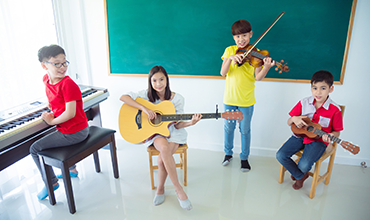Playing a musical instrument has many advantages beyond making harmonious sounds. From boosting cognitive performance to providing an outlet for emotional expression, playing an instrument can be a powerful tool for enhancing mental and emotional well-being. So, before you say, “No” to your child’s desire to play the drums in a rock band, consider these benefits of playing an instrument.
Boosts Cognitive Performance
Playing a musical instrument activates areas of the brain that enhance cognitive performance. In one study, published by the National Library of Medicine, a group of preschool children took keyboard music lessons for six months. At the end of the study period, all the children could play simple songs by Mozart and Beethoven. They also tested 30% higher on reasoning tests than other children who were in the study but didn’t have keyboard lessons. In other similar experiments, children who took piano lessons scored significantly higher on math tests than control groups.
Improves Physical Coordination
Playing an instrument improves physical coordination. As students read musical notes and symbols, they convert what they see to hand, finger and body movements. With ongoing practice, the halting and often incorrect notes of the beginner become flowing melodies as hand-eye coordination improves. Using the fingers to play combinations of keys, strings or valves develops fine motor skills. People who play percussion instruments, such as drums, must learn to use both hands and feet to produce the rhythms.
Facilitates Social Connections and Teamwork
Children who play an instrument with a group or sing with a choir develop social connections with other musicians, not unlike the connections kids make on a sports team. Children in the group are expected to attend practices and rehearsals together. As students get to know each other, they support and motivate one another. Over time every musician in the group becomes highly aware of how her own musical contribution is integral to the success of each performance. Every musician is important. To avoid letting their peers down, students develop the desire to practice so that they can perform the assigned music without mistakes. When a performance goes well, everyone celebrates as a team.
Encourages Focus
Learning a musical instrument encourages focus. Students soon realize that practice time is wasted if they mindlessly play through the notes with their thoughts somewhere else. That means paying close attention to every note, bar, phrase and section. Some parts of the music will come easily; other parts will be difficult. Learning a piece of music requires that students isolate the hard parts and practice them until mastered. The better a student can focus, the better a musician she becomes. Students who learn to focus while practicing can easily transfer this skill to studying and mastering academic subjects.
Amplifies Self Esteem
Playing an instrument amplifies self-esteem. Some music teachers require their students to maintain a set number of pieces, sometimes called a repertoire, that they can play from memory. For pianists, the pay-off from all those hours of practice comes when they can sit down at any piano, whether in a hotel lobby or a friend’s house and wow onlookers with an impromptu performance.
Provides an Outlet for Emotional Expression
Instruments can be used to express emotions—sadness, anger, joy and disappointment can all be processed by playing an instrument. An Austin mother reports that she can tell when her daughter, Emma has had a bad day. She drops her backpack at the door and goes straight to the piano. If sad or disappointed, she plays a slow movement of a sonata in a minor key with a heavy, plodding bass. When feeling joyful, she’ll play a Mozart minuet or a fast, light piece. Spending time playing an instrument in moments of intense emotion helps anyone identify feelings and release them through music. The ability to express and process one’s emotions through music is a valuable, life-long skill.
Brenda Schoolfield is a medical writer and editor who lives in Austin. Sugar, her cocker spaniel and sometimes a rescue foster dog or two keep her company while she writes.

















